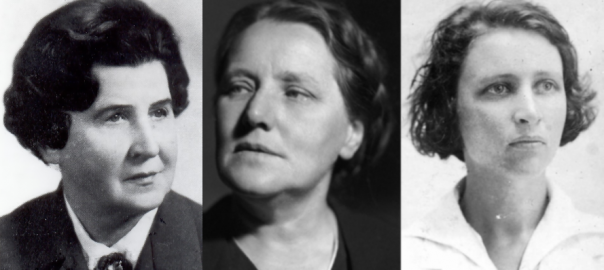Volume 5.2 of The Journal for the History of Analytical Philosophy (JHAP) has now been published.
This volume is a special issue on Women in Early Analytic Philosophy, edited by Maria van der Schaar and Eric Schliesser.
In addition to an introduction by the editors, the volume contains these articles:
“Susan Stebbing, Incomplete Symbols and Foundherentist Meta-Ontology” by Frederique Janssen-Lauret. Abstract:
Susan Stebbing’s work on incomplete symbols and analysis was instrumental in clarifying, sharpening, and improving the project of logical constructions which was pivotal to early analytic philosophy. She dispelled use-mention confusions by restricting the term ‘incomplete symbol’ to expressions eliminable through analysis, rather than those expressions’ purported referents, and distinguished linguistic analysis from analysis of facts. In this paper I explore Stebbing’s role in analytic philosophy’s development from anti-holism, presupposing that analysis terminates in simples, to the more holist or foundherentist analytic philosophy of the later 20th century. I read Stebbing as a transitional figure who made room for more holist analytic movements, e.g., applications of incomplete symbol theory to Quinean ontological commitment. Stebbing, I argue, is part of a historical narrative which starts with the holism of Bradley, an early influence on her, to which Moore and Russell’s logical analysis was a response. They countered Bradley’s holist reservations about facts with the view that the world is built up out of individually knowable simples. Stebbing, a more subtle and sympathetic reader of the British idealists, defends analysis, but with important refinements and caveats which prepared the way for a return to foundherentism and holism within analytic philosophy.
“Maria Kokoszyńska: Between the Lvov-Warsaw School and the Vienna Circle” by Anna Brożek. Abstract:
Maria Kokoszyńska-Lutmanowa (1905–1981) was one of the most outstanding female representatives of the Lvov-Warsaw School. After achieving her PhD in philosophy under Kazimierz Twardowski’s supervision, she was Kazimierz Ajdukiewicz’s assistant. She was also influenced by Alfred Tarski whose results in semantics she analyzed and popularized. After World War II, she got the chair of logic in University of Wrocław and she organized studies in logic in this academic center. In the 1930s, Kokoszyńska kept in contact with members of the Vienna Circle and became a kind of connecting factor between Polish logicians and the Viennese group. In Poland, she presented the views of members of the Vienna Circle. In Vienna, she emphasized the results of her Polish colleagues. In the present paper, some of Kokoszyńska’s results connected with the matters discussed in the Vienna Circle are presented, namely with the problem of metaphysics, the status of logic and the idea of unity of science.
“Susanne Langer and the Woeful World of Facts” by Giulia Felappi. Abstract:
Susanne Langer is mainly known as the American philosopher who, starting from her famous Philosophy in a New Key (1942), worked in aesthetics and famously saw art as the product of the human mind’s most important, distinctive and remarkable ability, i.e., the ability to symbolise. But Langer’s later consideration of the connection between art and symbol is propagated by an early interest in the logic of symbols themselves. This rather neglected early part of Langer’s thought and her early interests and lines of reasoning, which she somehow abandoned later on to dedicate herself exclusively to the study of art, are the topic of this paper.
JHAP is available at https://jhaponline.org. All articles are freely available and open access. Submissions welcome!

